 W
WThis is a list of the member states of the Organisation internationale de la Francophonie. These countries belong to an international organisation representing countries and regions where French is the first ("mother") or customary language, where a significant proportion of the population are francophones or where there is a notable affiliation with French culture.
 W
WAlbania, officially the Republic of Albania, is a country in Southeast Europe on the Adriatic and Ionian Sea within the Mediterranean Sea. It shares land borders with Montenegro to the northwest, Kosovo to the northeast, North Macedonia to the east, Greece to the south and maritime borders with Greece, Montenegro and Italy to the west.
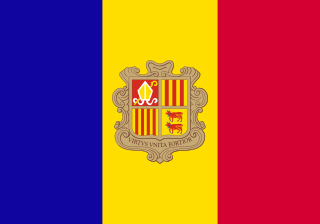 W
WAndorra, officially the Principality of Andorra, is a sovereign landlocked microstate on the Iberian Peninsula, in the eastern Pyrenees, bordered by France to the north and Spain to the south. Believed to have been created by Charlemagne, Andorra was ruled by the count of Urgell until 988, when it was transferred to the Roman Catholic Diocese of Urgell. The present principality was formed by a charter in 1278. It is known as a principality as it is a diarchy headed by two princes: the Bishop of Urgell in Catalonia, Spain, and the President of the French Republic.
 W
WBelgium, officially the Kingdom of Belgium, is a country in Western Europe. It is bordered by the Netherlands to the north, Germany to the east, Luxembourg to the southeast, France to the southwest, and the North Sea to the northwest. It covers an area of 30,689 km2 (11,849 sq mi) and has a population of more than 11.5 million, making it the 22nd most densely populated country in the world and the 6th most densely populated country in Europe, with a density of 376 per square kilometre (970/sq mi). The capital and largest city is Brussels; other major cities are Antwerp, Ghent, Charleroi, Liège, Bruges, Namur, and Leuven.
 W
WBenin, officially the Republic of Benin and formerly known as Dahomey, is a country in West Africa. It is bordered by Togo to the west, Nigeria to the east, Burkina Faso to the north-west, and Niger to the north-east. The majority of its population lives on the small southern coastline of the Bight of Benin, part of the Gulf of Guinea in the northernmost tropical portion of the Atlantic Ocean. The capital of Benin is Porto-Novo, but the seat of government is in Cotonou, the country's largest city and economic capital. Benin covers an area of 114,763 square kilometres (44,310 sq mi) and its population in 2018 was estimated to be approximately 11.49 million. Benin is a tropical nation, highly dependent on agriculture, and is a large exporter of cotton and palm oil. Substantial employment and income arise from subsistence farming.
 W
WBurkina Faso is a landlocked country in West Africa that covers an area of around 274,200 square kilometres (105,900 sq mi) and is bordered by Mali to the northwest, Niger to the northeast, Benin to the southeast, Togo and Ghana to the south, and the Ivory Coast to the southwest. The July 2019 population estimate by the United Nations was 20,321,378. Previously called Republic of Upper Volta (1958–1984), it was renamed "Burkina Faso" on 4 August 1984 by President Thomas Sankara. Its citizens are known as Burkinabé, and its capital is Ouagadougou. Due to French colonialism, the country's official language of government and business is French, but this language is spoken by approximately only 10-15% of the population. There are 59 native languages spoken in Burkina, with the most common language, Moore, spoken by roughly 50% of Burkinabé.
 W
WBurundi, officially the Republic of Burundi, is a landlocked country in the Great Rift Valley where the African Great Lakes region and East Africa converge. It is bordered by Rwanda to the north, Tanzania to the east and southeast, and the Democratic Republic of the Congo to the west; Lake Tanganyika lies along its southwestern border. The capital cities are Gitega and Bujumbura.
 W
WCambodia, officially the Kingdom of Cambodia, is a country located in the southern portion of the Indochina peninsula in Southeast Asia. It is 181,035 square kilometres in area, bordered by Thailand to the northwest, Laos to the northeast, Vietnam to the east and the Gulf of Thailand to the southwest.
 W
WCameroon, officially the Republic of Cameroon, is a country in Central Africa and West Africa. It is bordered by Nigeria to the west and north; Chad to the northeast; the Central African Republic to the east; and Equatorial Guinea, Gabon and the Republic of the Congo to the south. Cameroon's coastline lies on the Bight of Biafra, part of the Gulf of Guinea and the Atlantic Ocean. Although Cameroon is not an ECOWAS member state, it is geographically and historically in West Africa; the Southern Cameroons, which now form her Nord-Ouest and Sud-Ouest Regions, have a strong West African history in particular. However, since 2017, elements within the South West and North West regions have since declared an independent state called Ambazonia. The country is sometimes identified as West African and other times as Central African due to its strategic position at the crossroads between West and Central Africa. Cameroon is home to over 250 native languages spoken by nearly 25 million people.
 W
WCanada is a country in the northern part of North America. Its ten provinces and three territories extend from the Atlantic to the Pacific and northward into the Arctic Ocean, covering 9.98 million square kilometres, making it the world's second-largest country by total area. Its southern and western border with the United States, stretching 8,891 kilometres (5,525 mi), is the world's longest bi-national land border. Canada's capital is Ottawa, and its three largest metropolitan areas are Toronto, Montreal, and Vancouver.
 W
WCape Verde or Cabo Verde, officially the Republic of Cabo Verde, is an island country in the central Atlantic Ocean. The ten volcanic islands in its archipelago have a combined land area of about 4,033 square kilometres (1,557 sq mi).
 W
WThe Central African Republic is a landlocked country in Central Africa. It is bordered by Chad to the north, Sudan to the northeast, South Sudan to the southeast, the Democratic Republic of the Congo to the south, the Republic of the Congo to the southwest and Cameroon to the west. The CAR covers a land area of about 620,000 square kilometres (240,000 sq mi) and had an estimated population of around 4.7 million as of 2018. As of 2020, the CAR is the scene of a civil war, ongoing since 2012.
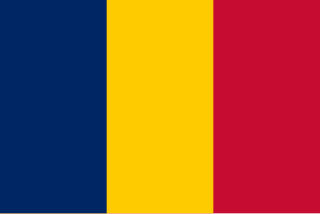 W
WChad, officially known as the Republic of Chad, is a landlocked country in north-central Africa. It is bordered by Libya to the north, Sudan to the east, the Central African Republic to the south, Cameroon to the south-west, Nigeria to the southwest, and Niger to the west.
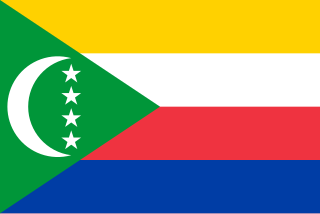 W
WThe Comoros, officially the Union of the Comoros, is an island country in the Indian Ocean located at the northern end of the Mozambique Channel off the eastern coast of Africa. It shares maritime borders with Madagascar and the French region of Mayotte to the southeast, Tanzania to the northwest, Mozambique to the west, and the Seychelles to the northeast. The capital and largest city in Comoros is Moroni. In addition, the religion of the majority of the population, and the official state religion, is Sunni Islam. As a member of the Arab League, the Comoros is the only country in the Arab world which is entirely in the Southern Hemisphere. It is also a member state of the African Union, the Organisation internationale de la Francophonie, the Organisation of Islamic Cooperation, and the Indian Ocean Commission. Furthermore, the Union of the Comoros has three official languages—Comorian, French, and Arabic.
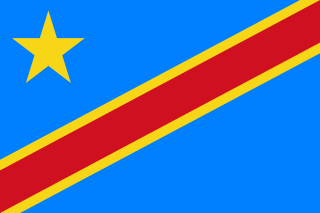 W
WThe Democratic Republic of the Congo (DRC), also known as Congo-Kinshasa, DR Congo, the DROC, or simply either Congo or the Congo, and historically Zaire, is a country in Central Africa. It is, by area, the largest country in sub-Saharan Africa, the second-largest in all of Africa, and the 11th-largest in the world. With a population of over 101 million, the Democratic Republic of the Congo is the most-populous officially Francophone country in the world, as well as the 4th-most populous in Africa, and the 15th-most populous country in the world. Since 2015, the Eastern DR Congo has been the scene of an ongoing military conflict in Kivu.
 W
WThe Republic of the Congo, also known as Congo-Brazzaville, the Congo Republic or simply either Congo or the Congo is a country located in the western coast of Central Africa. To the west lies Gabon; Cameroon to its northwest and the Central African Republic to its northeast; the Democratic Republic of the Congo to the southeast and the Angolan exclave of Cabinda to its south; and the Atlantic Ocean to its southwest. The official language is French.
 W
WDjibouti, Jibuti, officially the Republic of Djibouti, is a country located in the Horn of Africa. It is bordered by Somalia in the south, Ethiopia in the southwest, Eritrea in the north, and the Red Sea and the Gulf of Aden in the east. Across the Gulf of Aden is Yemen. The country has a total area of 23,200 km2 (8,958 sq mi). The Republic of Djibouti is predominantly inhabited by two ethnic groups, the Somali and the Afar people, with the former comprising the majority of the population.
 W
WDominica, officially the Commonwealth of Dominica, is an island country in the Caribbean. The capital, Roseau, is located on the western side of the island. It is geographically situated as part of the Windward Islands chain in the Lesser Antilles archipelago in the Caribbean Sea. The island is located near Guadeloupe to the northwest and Martinique to the south-southeast. Its area is 750 km2 (290 sq mi), and the highest point is Morne Diablotins, at 1,447 m (4,747 ft) in elevation. The population was 71,293 at the 2011 census.
 W
WEgypt, officially the Arab Republic of Egypt, is a transcontinental country spanning the northeast corner of Africa and southwest corner of Asia by a land bridge formed by the Sinai Peninsula. Egypt is a Mediterranean country bordered by the Gaza Strip (Palestine) and Israel to the northeast, the Gulf of Aqaba and the Red Sea to the east, Sudan to the south, and Libya to the west. Across the Gulf of Aqaba lies Jordan, across the Red Sea lies Saudi Arabia, and across the Mediterranean lie Greece, Turkey and Cyprus, although none share a land border with Egypt.
 W
WEquatorial Guinea, officially the Republic of Equatorial Guinea, is a country located on the west coast of Central Africa, with an area of 28,000 square kilometres (11,000 sq mi). Formerly the colony of Spanish Guinea, its post-independence name evokes its location near both the Equator and the Gulf of Guinea. As of 2015, the country had a population of 1,225,367.
 W
WFrance, officially the French Republic, is a country, primarily located in Western Europe, consisting of metropolitan France and several overseas regions and territories. The metropolitan area of France extends from the Rhine to the Atlantic Ocean and from the Mediterranean Sea to the English Channel and the North Sea. It borders Belgium, Luxembourg and Germany to the northeast, Switzerland, Monaco and Italy to the east and Andorra and Spain to the south. The overseas territories include French Guiana in South America and several islands in the Atlantic, Pacific and Indian Oceans. The country's 18 integral regions span a combined area of 643,801 km2 (248,573 sq mi) and a total population of 67.07 million. France is a unitary semi-presidential republic with its capital in Paris, the country's largest city and main cultural and commercial centre. Other major urban areas include Lyon, Marseille, Toulouse, Bordeaux, Lille and Nice. France, including its overseas territories, has the most time zones of any country, with a total of 12.
 W
WGabon, officially the Gabonese Republic, is a country on the west coast of Central Africa. Located on the equator, Gabon is bordered by Equatorial Guinea to the northwest, Cameroon to the north, the Republic of the Congo on the east and south, and the Gulf of Guinea to the west. It has an area of nearly 270,000 square kilometres (100,000 sq mi) and its population is estimated at 2.1 million people. Its capital and largest city is Libreville. The official language is French.
 W
WGreece, officially the Hellenic Republic, also known as Hellas, is a country located in Southeast Europe. Its population is approximately 10.7 million as of 2018; Athens is its largest and capital city, followed by Thessaloniki.
 W
WGuinea, officially the Republic of Guinea, is a west-coastal country in West Africa. Formerly known as French Guinea, the modern country is sometimes referred to as Guinea-Conakry to distinguish it from other countries with "Guinea" in the name and the eponymous region, such as Guinea-Bissau and Equatorial Guinea. Guinea has a population of 12.4 million and an area of 245,857 square kilometres (94,926 sq mi).
 W
WGuinea-Bissau, officially the Republic of Guinea-Bissau, is a country in West Africa that covers 36,125 square kilometres (13,948 sq mi) with an estimated population of 1,874,303. It borders Senegal to the north and Guinea to the south-east.
 W
WHaiti, officially the Republic of Haiti and formerly known as Hayti, is a country located on the island of Hispaniola in the Greater Antilles archipelago of the Caribbean Sea, to the east of Cuba and Jamaica and south of The Bahamas and the Turks and Caicos Islands. It occupies the western three-eighths of the island which it shares with the Dominican Republic. To its south-west lies the small island of Navassa Island, which is claimed by Haiti but is disputed as a United States territory under federal administration. Haiti is 27,750 square kilometers (10,714 sq mi) in size, the third largest country in the Caribbean by area, and has an estimated population of 11.4 million, making it the most populous country in the Caribbean.
 W
WIvory Coast, also known as Côte d'Ivoire, officially the Republic of Côte d'Ivoire, is a country located on the south coast of West Africa. Ivory Coast's political capital is Yamoussoukro in the center of the country, while its economic capital and largest city is the port city of Abidjan. It borders Guinea to the northwest, Liberia to the west, Mali to the northwest, Burkina Faso to the northeast, Ghana to the east, and the Gulf of Guinea to the south. The official language of the republic is French, with local indigenous languages also being widely used that include Baoulé, Dioula, Dan, Anyin, and Cebaara Senufo. In total, there are around 78 different languages spoken in Ivory Coast. The country has large populations of adherents of Christianity, Islam and various indigenous religions.
 W
WLaos, officially the Lao People's Democratic Republic, is a socialist state and the only landlocked country in Southeast Asia. At the heart of the Indochinese Peninsula, Laos is bordered by Myanmar and China to the northwest, Vietnam to the east, Cambodia to the southeast and Thailand to the west and southwest.
 W
WLebanon, officially known as the Lebanese Republic, is a country in the Levant region of Western Asia, and the transcontinental region of the Middle East. It is bordered by Syria to the north and east and Israel to the south, while Cyprus lies west across the Mediterranean Sea. Lebanon's location at the crossroads of the Mediterranean Basin and the Arabian hinterland has contributed to its rich history and shaped a cultural identity of religious and ethnic diversity. At just 10,452 km2, it is the smallest recognized sovereign state on the mainland Asian continent. The official language, Arabic, is the most common language spoken by the citizens of Lebanon.
 W
WLuxembourg, officially the Grand Duchy of Luxembourg, is a landlocked country in Western Europe. It is bordered by Belgium to the west and north, Germany to the east, and France to the south. Its capital, Luxembourg City, is one of the four official capitals of the European Union and the seat of the Court of Justice of the European Union, the highest judicial authority in the EU. Its culture, people, and languages are highly intertwined with its neighbours, making it essentially a mixture of French and German cultures, as evident by the nation's three official languages: French, German, and the national language of Luxembourgish. The repeated invasions by Germany, especially in World War II, resulted in the country's strong will for mediation between France and Germany and, among other things, led to the foundation of the European Union.
 W
WMadagascar, officially the Republic of Madagascar, and previously known as the Malagasy Republic, is an island country in the Indian Ocean, approximately 400 kilometres off the coast of East Africa. At 592,800 square kilometres (228,900 sq mi) Madagascar is the world's second-largest island country. The nation comprises the island of Madagascar and numerous smaller peripheral islands. Following the prehistoric breakup of the supercontinent Gondwana, Madagascar split from the Indian subcontinent around 88 million years ago, allowing native plants and animals to evolve in relative isolation. Consequently, Madagascar is a biodiversity hotspot; over 90% of its wildlife is found nowhere else on Earth. The island's diverse ecosystems and unique wildlife are threatened by the encroachment of the rapidly growing human population and other environmental threats.
 W
WMali, officially the Republic of Mali, is a landlocked country in West Africa. Mali is the eighth-largest country in Africa, with an area of just over 1,240,000 square kilometres (480,000 sq mi). The population of Mali is 19.1 million. 67% of its population was estimated to be under the age of 25 in 2017. Its capital is Bamako. The sovereign state of Mali consists of eight regions and its borders on the north reach deep into the middle of the Sahara Desert, while the country's southern part, where the majority of inhabitants live, features the Niger and Senegal rivers. The country's economy centers on agriculture and mining. Some of Mali's prominent natural resources include gold, being the third largest producer of gold on the African continent, and salt.
 W
WMauritania, officially the Islamic Republic of Mauritania, is a country in Northwest Africa. It is the eleventh largest sovereign state in Africa and is bordered by the Atlantic Ocean to the west, Western Sahara to the north and northwest, Algeria to the northeast, Mali to the east and southeast, and Senegal to the southwest.
 W
WMauritius, officially the Republic of Mauritius, is an island nation in the Indian Ocean about 2,000 kilometres (1,200 mi) off the southeast coast of the African continent, east of Madagascar. It includes the eponymous main island of Mauritius and Rodrigues, Agaléga and St. Brandon. The islands of Mauritius and Rodrigues form part of the Mascarene Islands, along with nearby Réunion, a French overseas department. The capital and largest city, Port Louis, is located on Mauritius, where most of the population is concentrated. The country spans 2,040 square kilometres (790 sq mi) and has an Exclusive Economic Zone covering 2.3 million square kilometres.
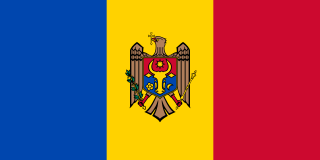 W
WMoldova, officially the Republic of Moldova, is a landlocked country in Eastern Europe. It is bordered by Romania to the west and Ukraine to the north, east, and south. The capital city is Chișinău.
 W
WMonaco, officially the Principality of Monaco, is a sovereign city-state, and microstate on the French Riviera in Western Europe. It is bordered by France to the north, east and west, and by the Mediterranean Sea to the south. The principality is home to 38,682 residents, of which 9,486 are Monegasque nationals and is widely recognised for being one of the most expensive and wealthiest places in the world. The official language is French, although Monégasque, English and Italian are spoken and understood by a sizeable group.
 W
WMorocco, officially the Kingdom of Morocco, is a country located in the Maghreb region of North Africa. It overlooks the Mediterranean Sea to the north and the Atlantic Ocean to the west, with land borders with Algeria to the east and Western Sahara to the south. Morocco also claims the exclaves of Ceuta, Melilla and Peñón de Vélez de la Gomera, all of them under Spanish jurisdiction, as well as several small Spanish-controlled islands off its coast. The capital is Rabat and the largest city is Casablanca. Morocco spans an area of 710,850 km2 (274,460 sq mi) and has a population of over 36 million.
 W
WNorth Macedonia, officially the Republic of North Macedonia, is a country in Southeast Europe. It gained independence in 1991 as one of the successor states of Yugoslavia. North Macedonia is a landlocked country bordering with Kosovo to the northwest, Serbia to the north, Bulgaria to the east, Greece to the south, and Albania to the west. It constitutes approximately the northern third of the larger geographical region of Macedonia. Skopje, the capital and largest city, is home to a quarter of the country's 2.06 million population. The majority of the residents are ethnic Macedonians, a South Slavic people. Albanians form a significant minority at around 25%, followed by Turks, Romani, Serbs, Bosniaks, and Aromanians.
 W
WRwanda, officially the Republic of Rwanda, is a landlocked country in the Great Rift Valley where the African Great Lakes region and East Africa converge. One of the smallest countries on the African mainland, its capital city is Kigali. Located a few degrees south of the Equator, Rwanda is bordered by Uganda, Tanzania, Burundi, and the Democratic Republic of the Congo. It is highly elevated, giving it the soubriquet "land of thousand hills", with its geography dominated by mountains in the west and savanna to the east, with numerous lakes throughout the country. The climate is temperate to subtropical, with two rainy seasons and two dry seasons each year. Rwanda has a population of over 12.6 million living on 26,338 km2 of land, and is the most densely populated mainland African country.
 W
WSaint Lucia is a sovereign island country in the West Indies in the eastern Caribbean Sea on the boundary with the Atlantic Ocean. The island was previously called Iyonola, the name given to the island by the native Arawaks and later, Hewanorra, the name given by the native Caribs, two separate Amerindian peoples. Part of the Lesser Antilles, it is located north/northeast of the island of Saint Vincent, northwest of Barbados and south of Martinique. It covers a land area of 617 km2 and reported a population of 165,595 in the 2010 census. Its capital is Castries.
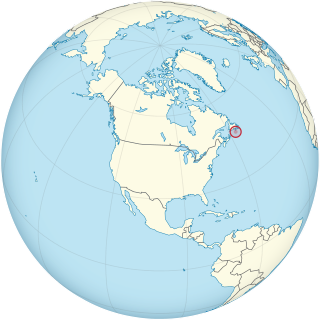 W
WSaint Pierre and Miquelon, officially the Territorial Collectivity of Saint-Pierre and Miquelon, is a self-governing territorial overseas collectivity of France in the northwestern Atlantic Ocean near the Canadian province of Newfoundland and Labrador. It is the only remaining part of New France in North America to retain French sovereignty, appellate jurisdiction and mineral rights. For this it returns a full member of the National Assembly, contributes to the Senate and Presidential elections and its people are guaranteed French citizenship. It covers 242 square kilometres (93 sq mi) of land and shores and has a population of 6,008 as of the March 2016 census.
 W
WSenegal, officially the Republic of Senegal, is a country in West Africa. Senegal is bordered by Mauritania in the north, Mali to the east, Guinea to the southeast, and Guinea-Bissau to the southwest. Senegal nearly surrounds The Gambia, a country occupying a narrow sliver of land along the banks of the Gambia River, which separates Senegal's southern region of Casamance from the rest of the country. Senegal also shares a maritime border with Cape Verde. Senegal's economic and political capital is Dakar.
 W
WSwitzerland, officially the Swiss Confederation, is a country situated at the confluence of Western, Central, and Southern Europe. It is a federal republic composed of 26 cantons, with federal authorities based in Bern. Switzerland is a landlocked country bordered by Italy to the south, France to the west, Germany to the north, and Austria and Liechtenstein to the east. It is geographically divided among the Swiss Plateau, the Alps, and the Jura, spanning a total area of 41,285 km2 (15,940 sq mi), and land area of 39,997 km2 (15,443 sq mi). While the Alps occupy the greater part of the territory, the Swiss population of approximately 8.5 million is concentrated mostly on the plateau, where the largest cities and economic centres are located, among them Zürich, Geneva and Basel. These cities are home to several offices of international organisations such as the headquarters of FIFA, the UN's second-largest Office, and the main building of the Bank for International Settlements. The main international airports of Switzerland are also located in these cities.
 W
WTogo, officially the Togolese Republic, is a country in West Africa bordered by Ghana to the west, Benin to the east and Burkina Faso to the north. The country extends south to the Gulf of Guinea, where its capital Lomé is located. Togo covers 57,000 square kilometres, making it one of the smallest countries in Africa, with a population of approximately 7.9 million, as well as one of the narrowest countries in the world with a width of less than 115 km (71 mi) between Ghana and its slightly larger eastern neighbor, Benin.
 W
WTunisia, officially the Republic of Tunisia, is a country in the Maghreb region of North Africa, covering 163,610 square kilometres. Its northernmost point, Cape Angela, is also the northernmost point on the African continent. Tunisia is bordered by Algeria to the west and southwest, Libya to the southeast, and the Mediterranean Sea to the north and east. Tunisia's population was 11.7 million in 2019. Tunisia's name is derived from its capital city Tunis, which is located on its northeast coast.